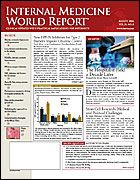Publication
Article
Black American Women, Regardless of Weight, at Increased Risk for Insulin Resistance
Author(s):
From the Endocrine Society
BOSTON—Black American women, even those who are not overweight, are at increased risk for insulin resistance, researchers reported at the annual meeting of the Endocrine Society. The data also suggest that black women should be evaluated for insulin resistance and cardiovascular (CV) risk using lower thresholds for body mass index (BMI) than used for their white and Hispanic counterparts (ie, the standard BMI levels currently used for all men and women).
This study aimed to determine the role of obesity in insulin resistance according to race (ie, black, white, and Hispanic). Investigators used data from the Insulin Resistance Atherosclerosis Study (IRAS), which was designed to assess insulin resistance and CV disease in a multiethnic population from 4 sites, 2 in California and 1 each in Texas and Colorado. For this present analysis, a cohort of 1625 white, black, and Hispanic nondiabetic women was included.
The female participants from the IRAS were divided into the following quartiles based on their BMI level: <25, 25-30, 31-35, and >35 kg/m2. A logistic analysis using the analysis of variance (ANOVA) model revealed that 47% of normal-weight black women had insulin resistance compared with only 18% of white women and 15% of Hispanic women.
IMWR
“This new information is clinically relevant to primary care physicians,” investigator Jorge Calles-Escandon, MD, of Wake Forest University, Winston- Salem, NC, told .
“The bottom-line message is that black females who are lean have double the prevalence of insulin resistance compared with Mexican Americans and white Anglo-Saxons who also are female and lean. Insulin resistance is the preamble to full-blown diabetes and a risk factor for disease, so there has to be more attention to African American women who are lean and not just the ones that are obese.”
These results, he said, suggest that race is an important risk factor for insulin resistance that should be considered along with such established risk factors as obesity.
It is not known what percentage of persons with insulin resistance develop diabetes and CV disease, but it is assumed that treating insulin resistance with weight loss and exercise will help prevent both conditions. “If these results hold true, black women may need to be evaluated and treated for insulin resistance and cardiovascular disease even at a weight not considered obese by current standards,” said Dr Calles-Escandon.
He noted that additional research is needed to answer the following questions:
• Are black men also at increased risk of insulin resistance?
• Do black women with insulin resistance have a greater percentage of body fat, or a different distribution of body fat, than white or Hispanic women?
• Are American blacks genetically predisposed to insulin resistance?
• Is insulin resistance in black women accompanied by other changes that could promote diabetes, CV disease, and diabetes?






